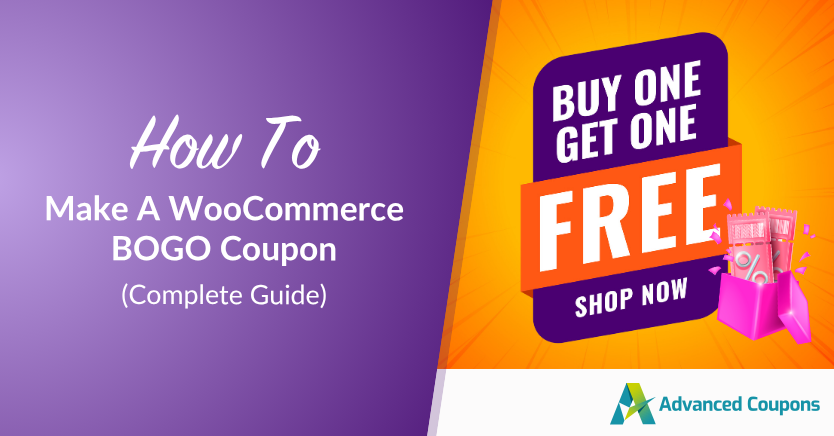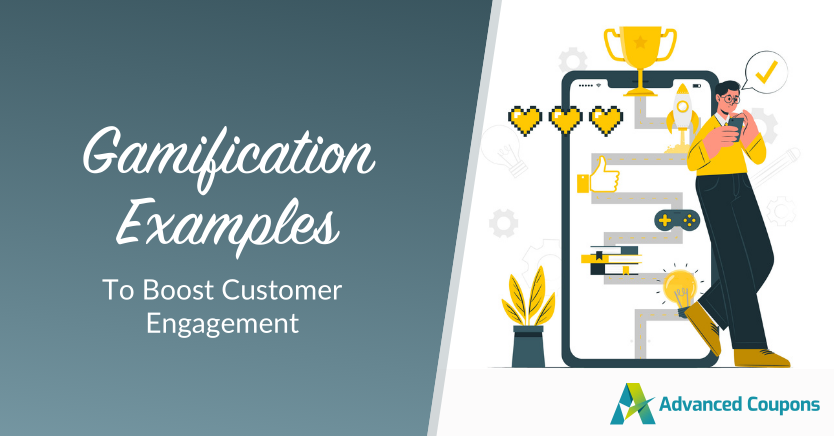
Today, shoppers want more than just the usual online shopping experience—they’re looking for something fun and interactive. That’s where gamification examples come in. By adding game-like features to your e-commerce site, you can turn a routine shopping trip into an exciting adventure.
Just imagine, instead of just browsing products, your customers are completing challenges, earning rewards, and maybe even competing with others. Gamification elements like these can really grab attention and keep people coming back for more.
In this article, we’re going to walk you through tried-and-true gamification examples in marketing that you can start incorporating into your store right away. We’ll also dive into the benefits of using these tactics and more. So let’s get started!
What Is Gamification?
Gamification involves incorporating game-like elements into non-game settings, such as websites, online communities, learning management systems, or a company’s intranet. Basically, the aim is to boost engagement among consumers, employees, and partners, encouraging them to interact more and complete desired actions in a fun and rewarding way.
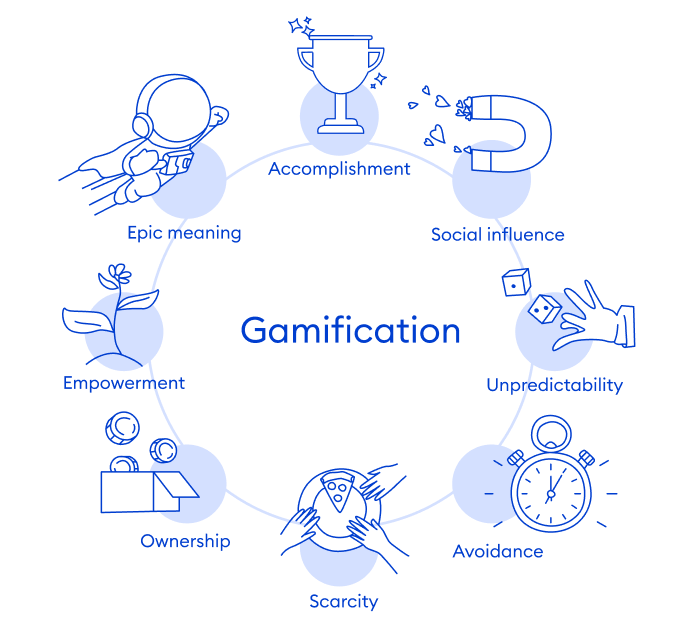
As an e-commerce store owner, you’re always looking for fresh ways to stand out and build strong connections with your customers. Gamification is a great tool for this. It boosts engagement, encourages the behaviors you want to see, and fosters a sense of loyalty and community around your brand.
In e-commerce, gamification for customer engagement entails using tools like point systems, progress tracking, surprise rewards, or interactive experiences (more on this later!).
Benefits Of Gamification For Your WooCommerce Store
Here’s why incorporating gamification examples into your WooCommerce store can work wonders for your business:
- Boosted customer engagement: Adding game-like elements like points, badges, and leaderboards transforms shopping into a fun adventure. This immersive experience keeps customers hooked and excited to interact with your brand.
- Strengthened customer loyalty: Gamification taps into our love for achievement and recognition. When customers can earn rewards and advance through challenges, they develop a stronger loyalty and commitment to your brand.
- Increased brand awareness and advocacy: Gamified experiences also create buzz around your brand. Customers love to share their achievements on social media, spreading the word about your brand and attracting new customers!
- Better customer insights: Leveraging gamification for customer engagement also helps you understand your customers better. What perks and challenges inspire them to take action? These interactive touchpoints offer valuable data that you can use to improve future campaigns.
8 Gamification Examples To Boost Customer Engagement
Now that you’re familiar with the awesome benefits of gamification, let’s dive into some gamification examples that can take your WooCommerce store to the next level and truly engage your customers:
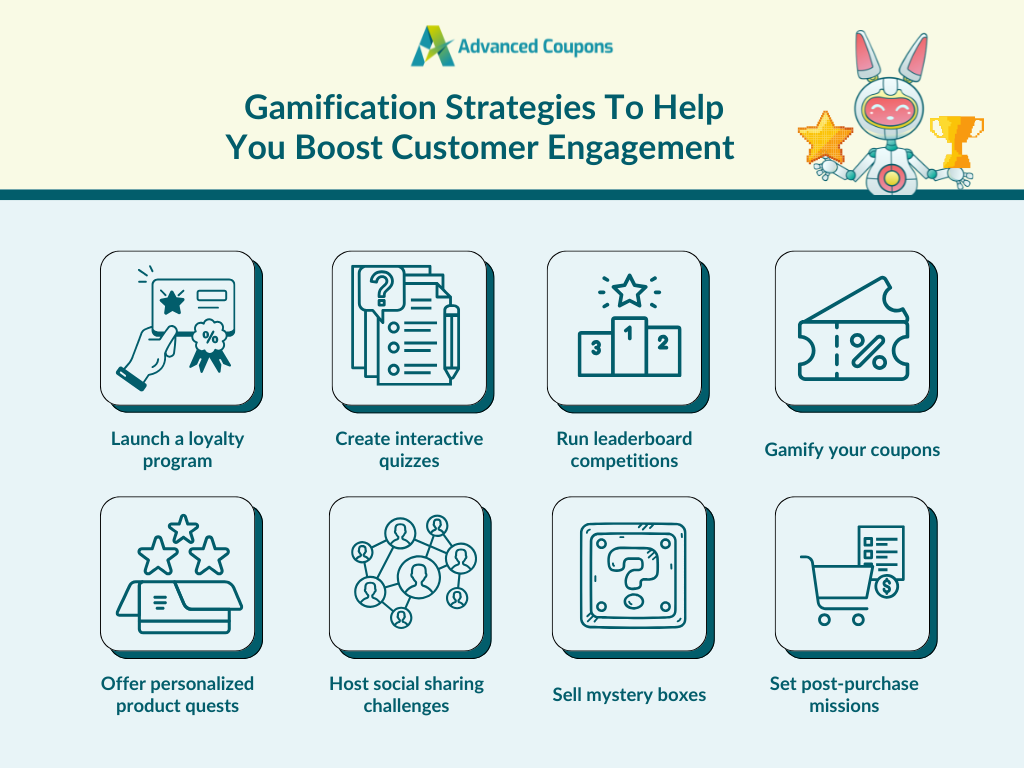
1. Loyalty programs and rewards
Loyalty programs are a classic gamification strategy that rewards customers for their continued engagement and purchases. By implementing a points-based system or offering exclusive rewards, you can incentivize customers to keep coming back to your store and encourage repeat business.
Here are some creative ways to implement loyalty programs and rewards:
- Points for Purchases: Award points to customers based on their spending, allowing them to redeem these points for discounts, free products, or exclusive perks.
- Tier-Based Rewards: Create different membership tiers (e.g., Bronze, Silver, Gold) with progressively better rewards and benefits as customers advance through the levels.
- Milestone Achievements: Celebrate significant milestones, such as a customer’s first purchase, their birthday, or their 100th order, with special rewards or discounts.
- Referral Bonuses: Incentivize customers to refer friends and family by offering bonus points or rewards for successful referrals.
🎯POWER TIP: Use plugins like WooCommerce Loyalty Program to easily launch a points-based rewards system in WooCommerce. With this plugin, you can grant points for actions like signing up as a customer, leaving a product review, making an order, and more!
2. Interactive games, quizzes, and surveys
Engaging customers with interactive quizzes and surveys is a fun and effective way to gather valuable insights. This gamification example not only makes the shopping experience more entertaining but also helps you learn more about your customers.
Consider offering rewards or discounts for participating in these quizzes. Your customers would be more inclined to share their preferences, opinions, and feedback. This information can be a goldmine for informing your product development and marketing strategies.
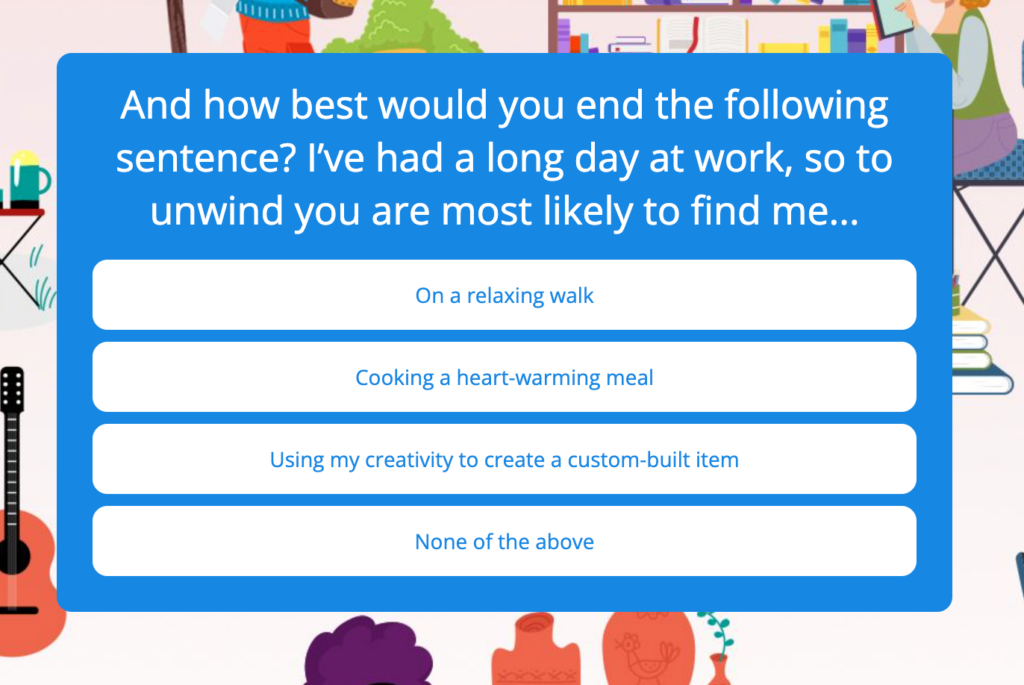
For instance, let’s say you run a beauty store.
You could create a quiz that helps customers find their perfect skincare routine. In return for completing the quiz, they get a discount on their next purchase.
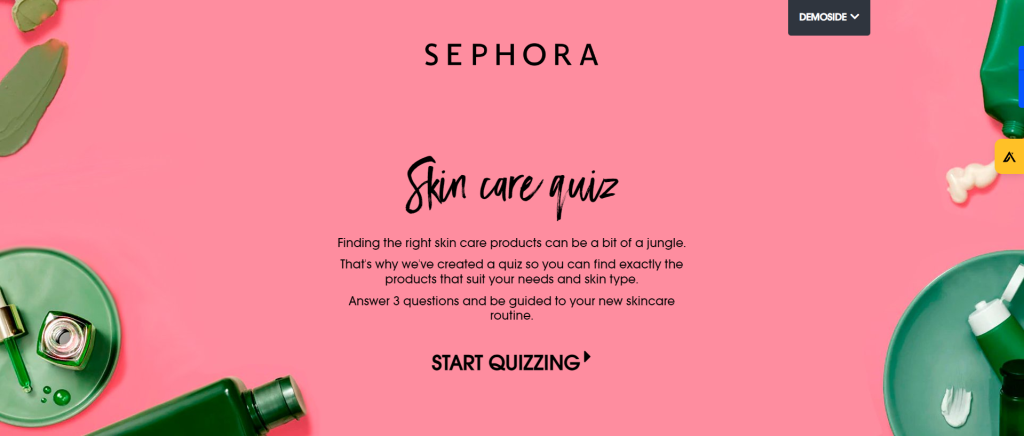
Another example could be a survey about their favorite product features, with a chance to win a gift card for participating. These gamification examples in marketing not only engage your customers but also provide you with valuable data to enhance your offerings.
3. Leaderboards and competition
Leaderboards and competitions really hit the mark when it comes to satisfying our innate drive for achievement and recognition. By setting up friendly contests and showing rankings, you can encourage your customers to engage more with your brand, aiming for top spots or cool prizes.
Let’s look at some gamification examples you can use:
- Social Media Challenges: Get the ball rolling with fun challenges on your social media platforms. Encourage your customers to share posts, tag friends, or complete specific tasks. The reward? A shot at winning prizes or climbing up the leaderboard.
- Product Review Leaderboards: You can also make writing reviews more exciting by showcasing a leaderboard of top reviewers. For one thing, this motivates customers to leave high-quality reviews. For another, it offers them rewards or recognition for their efforts.
- Sales Competitions: Spice things up with time-limited sales competitions. Challenge your customers to see who can make the most purchases or spend the highest amount within a set period. The winners get attractive prizes or discounts, making the competition even more enticing.
4. Coupons
Coupons have always been a go-to for e-commerce, giving customers discounts and incentives to shop. But what if you could make the coupon experience even more fun? By adding gamification, you can inject excitement and engagement, motivating customers to actively hunt for and use your coupons.
Here are some cool gamification examples for coupons:
- Scratch-Off Coupons: Think virtual scratch-off cards where customers can reveal hidden discounts or prizes. This adds a layer of surprise and anticipation to using coupons.
- Spin-to-Win Coupons: How about a virtual wheel or spinner? Customers can spin to reveal random coupon codes or discounts, bringing in a thrill of excitement and anticipation.
🎯 PRO TIP: RafflePress is a great tool for gamification for WooCommerce. Whether you’re looking to engage your audience or boost participation, RafflePress simplifies the process and adds a fun, game-like element to your promotions:
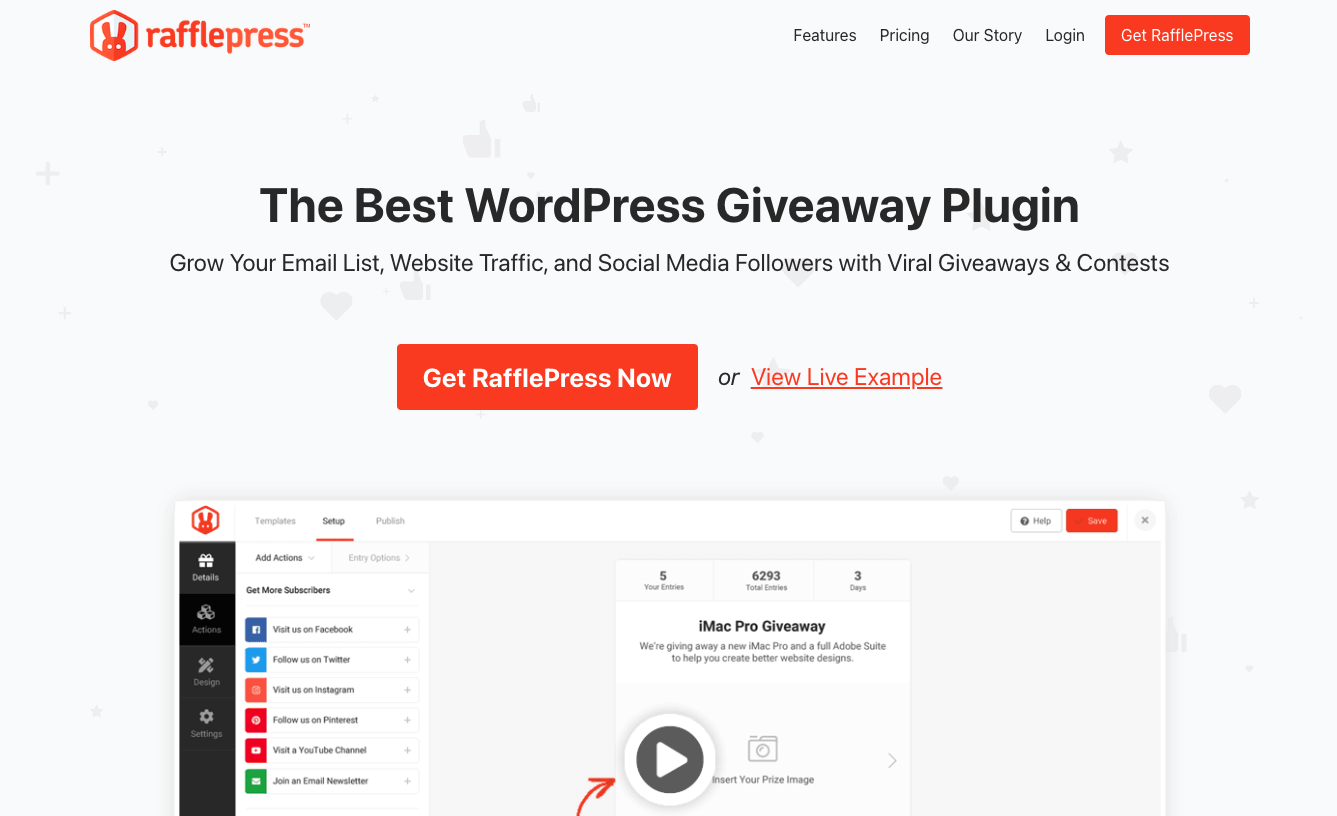
Now, if you’re feeling anxious about setting up coupons, don’t worry! Advanced Coupons has your back. This powerful plugin doesn’t just enhance your default coupon features; it also lets you create engaging, gamified coupons to make your customers’ experience more fun.
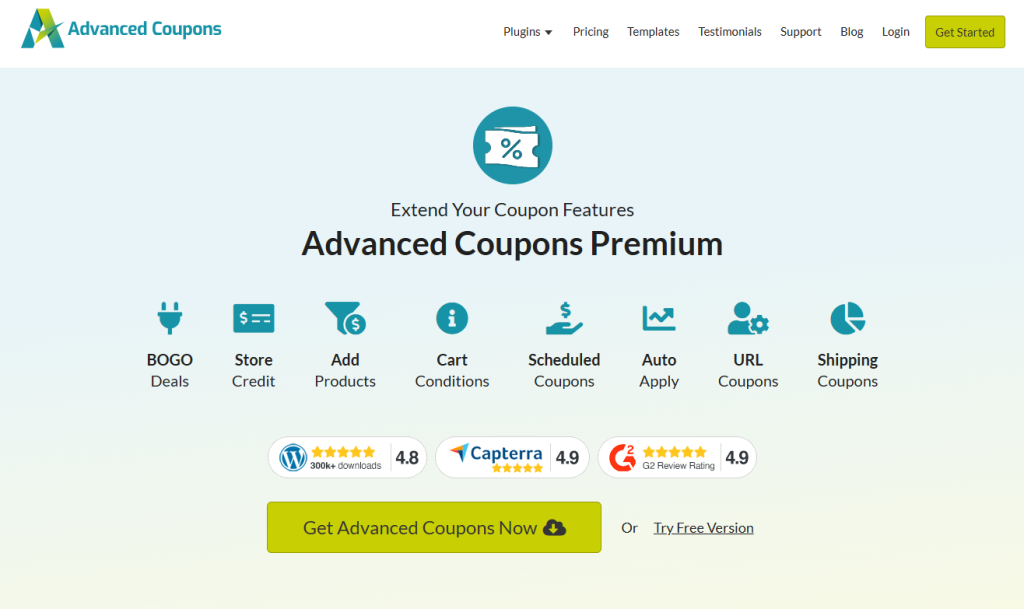
Want more inspiration? Check out this full guide for more ideas on how to run your coupons.
5. Personalized recommendations
Another great strategy for gamification is personalization. Imagine turning the usual shopping experience into an exciting game! By using gamification examples, you can make this happen.
Think about it: instead of just showing products, you can present them as part of a fun quest or challenge that matches each customer’s interests.
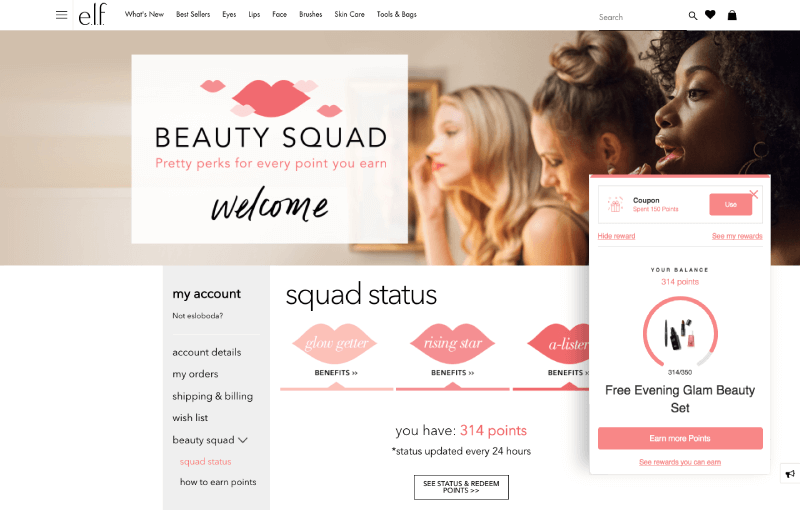
6. Social sharing challenges
Many successful brands leverage social media to grow their reach and build a community. You can make this strategy more exciting by incorporating gamification for customer engagement.
Consider hosting social sharing challenges on a weekly or monthly basis! These gamified campaigns encourage customers to interact with your brand on social media. You can offer fun rewards when they complete specific tasks, such as commenting on your post, tagging a friend, or posting a photo using a brand hashtag.
If you want to make this more engaging, you can feature standout posts and top entries on your website. Doing so can boost customer participation and strengthen their emotional ties with your brand.
7. Offer mystery boxes
We all love a good surprise, and chances are, your customers do too! Selling mystery gift boxes is a playful way to spark curiosity and excitement. With this strategy, shoppers purchase a “blind box” without knowing exactly what’s inside. It’s a tactic commonly used by beauty, stationery, and subscription services to generate buzz around their offerings.
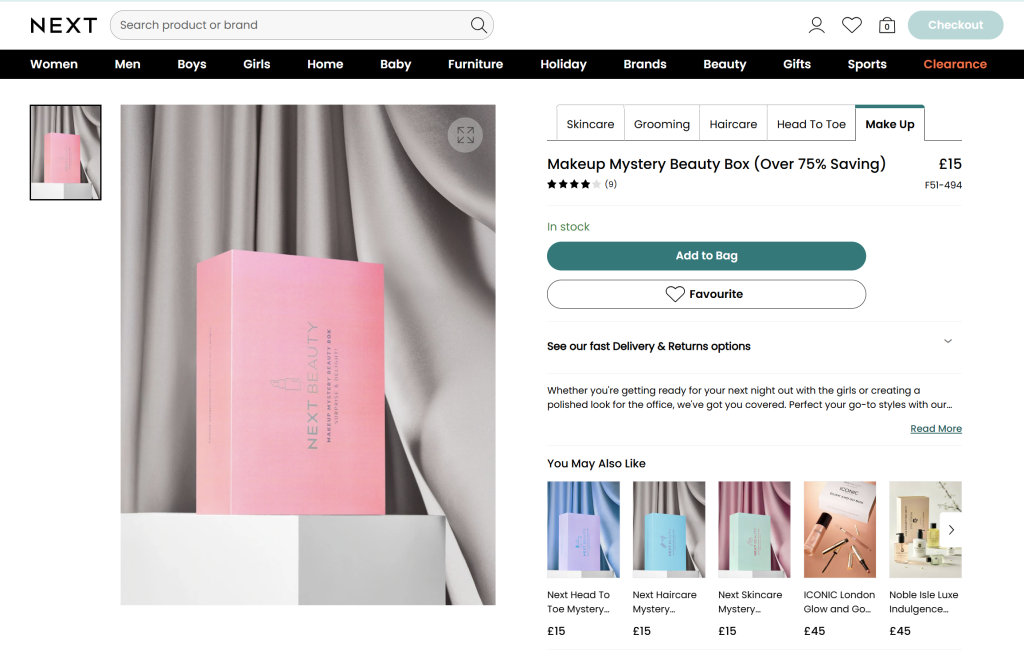
This approach also taps into the psychology of unpredictability, a key component in many gamification examples in marketing. You can play around with this strategy in a couple of ways, depending on what you sell. For instance, you can curate mystery boxes themed for a season, or curate your best sellers into an exclusive mystery kit.
8. Post-purchase missions
One of the biggest challenges for ecommerce store owners is keeping customers engaged after checkout. This is where gamification for customer engagement can help.
Launching “post-purchase missions” can help keep the momentum going even after the sale is made. These are easy-to-accomplish gamified tasks that invite customers to stay connected and involved with your brand. For example, you can invite customers to:
- Leave a review or rating of their recent purchase
- Refer a friend for a discount or reward
- Complete a short feedback survey for bonus points or a coupon
- Use their earned rewards or store credits toward their next order, like the example below:
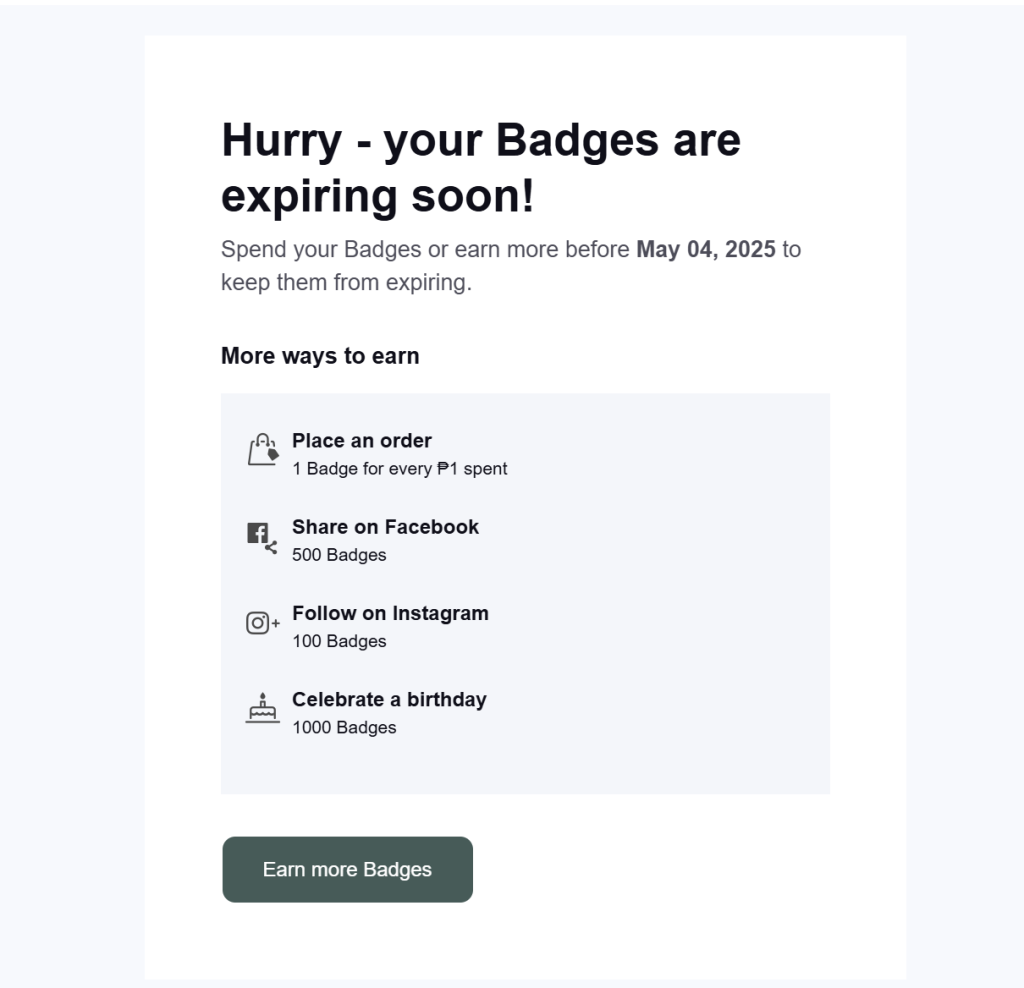
These small, doable mission makes interacting with your brand a lot more fun and memorable, which can help build brand affinity in the long run.
🎯POWER TIP: You can set up an automated post-purchase email sequence using tools like Drip to invite customers to complete these missions effortlessly.
Frequently Asked Questions
How can gamification boost customer engagement?
Gamification makes brand interactions more fun, rewarding, and interactive, which naturally boosts customer engagement. By adding game-like elements like challenges, badges, and milestones to your marketing campaign, you encourage more participation from customers. These tactics are part of gamification for customer engagement, helping to increase loyalty, repeat purchases, and overall brand excitement in the long run.
How is gamification used in marketing?
Some of the most common gamification examples in marketing include launching giveaways, running contests, offering mystery bundle boxes, and granting progress-based rewards. These examples make campaigns more interactive and exciting, encouraging more shoppers to engage with your brand and share your brand with others.
How are brands using gamification?
Brands incorporate gamification in many ways. Some common examples include launching a points-based rewards program, adding a spin-to-win game on your website, or setting up post-purchase missions. The goal is to create a more enjoyable shopping experience that boosts brand loyalty and engagement.
Conclusion
Gamification is a fantastic tool for WooCommerce store owners. It can take the shopping experience to a whole new level, keeping customers engaged and building strong brand loyalty. In this article, we’ll dive into proven gamification examples in marketing that you can start experimenting with on your store.
To recap, we’ve listed them down below:
- Loyalty programs and rewards
- Interactive games, quizzes, and surveys
- Leaderboards and competition
- Coupons
- Personalized recommendations
- Social sharing challenges
- Offering mystery boxes
- Post-purchase missions
Do you have any questions about these gamification examples? Let us know in the comments!

